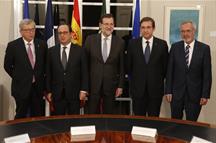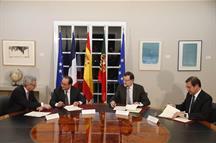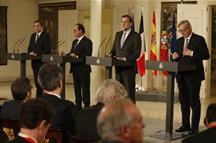Madrid Declaration on developing energy interconnections launched on Wednesday
President's News - 2015.3.4
1. Images of Summit and signing of Madrid Declaration | 2015.3.4
Moncloa Palace, Madrid
Mariano Rajoy called a meeting on Wednesday at Moncloa Palace with a view to making progress on European energy interconnections and the financing thereof through European funds, especially under the Juncker Investment Plan. The event culminated with the signing of the Madrid Declaration by the President of the Government of Spain, Mariano Rajoy, the President of the Republic of France, François Hollande, the Prime Minister of the Portuguese Republic, Pedro Passos Coelho, and the President of the European Commission, Jean-Claude Juncker.
At the subsequent press conference, the President of the Government of Spain explained that the commitments made at the meeting are highly significant for companies because they will enable them to access a resource that is key to their competitiveness at better and more foreseeable costs; highly significant for the environment because they will enable the development of renewable energies; and highly significant for European security because they will facilitate the diversification of energy sources and reduce the dependency of supply on unstable regions of the world.
Furthermore, he stressed that they will be highly positive for the people "because energy will be able to reach their homes at a lower cost, thereby generating an improvement in well-being".
 Pool MoncloaThe President of the Government added that "a political will has been expressed today at the highest level in order to launch this project, as well as the mechanisms and resources necessary to do so".
Pool MoncloaThe President of the Government added that "a political will has been expressed today at the highest level in order to launch this project, as well as the mechanisms and resources necessary to do so".
Mariano Rajoy recalled that the idea to hold this meeting came from the Prime Minister of Portugal, Pedro Passos Coelho, and was mainly aimed at "ending the energy island situation on the Iberian Peninsula" and working to create a European energy market.
He also said that the 2012 European Council meeting in Barcelona set an interconnection target between Member States of 10% and, although progress has been made towards that goal - as reflected by the inauguration of a high-voltage line between Spain and France on 20 February, there is still a long way to go.
Mariano Rajoy also underlined the importance of the Juncker Investment Plan for promoting European infrastructure projects and making it easier for SMEs to access credit. In this regard, he believes that "energy interconnection projects fall perfectly" within the boundaries of that plan, including those discussed on Wednesday. He went on to announce that Spain, through the ICO [Official Credit Institute], will contribute 1.5 billion euros to the plan's funding.
 Pool MoncloaThe meeting was attended by the President of the Republic of France, François Hollande; the Prime Minister of Portugal, Pedro Passos Coelho; the President of the European Commission, Jean Claude Juncker; the EU Commissioner for Climate Action and Energy, Miguel Arias Cañete; and the President of the European Investment Bank, Werner Hoyer.
Pool MoncloaThe meeting was attended by the President of the Republic of France, François Hollande; the Prime Minister of Portugal, Pedro Passos Coelho; the President of the European Commission, Jean Claude Juncker; the EU Commissioner for Climate Action and Energy, Miguel Arias Cañete; and the President of the European Investment Bank, Werner Hoyer.
Working for the well-being of all EU citizens
When asked about his position regarding the new Government of Greece, Mariano Rajoy stressed that the Government of Spain seeks "the best possible relations" with the Greek Government, "as it does with any of the other 27 governments of our partner countries in the European Union".
He stressed that Spain has not been either more or less demanding with Greece than it has with the other members of the Eurogroup. "We have reached the same decision as everyone else and that is a decision aimed at achieving growth and jobs in Greece, and for it to meet its obligations like everyone else", he said.
Mariano Rajoy believes that the statements accusing the Governments of Spain and Portugal of intending to change the Government of Greece "are misplaced". However, he added that what matters now "is the future, and all the decisions adopted by the Government of Spain and all the ideas we put forward in the European Union will always be in the best interests of the people and the search for maximum agreement and the broadest consensus with all countries".
 Pool MoncloaAs regards the strength of the economic recovery, the President of the Government recalled that Spain grew for the first time in six years in 2014 and the number of people in work rose by 450,000, thus reflecting "an extremely clear trend shift in the Spanish economy".
Pool MoncloaAs regards the strength of the economic recovery, the President of the Government recalled that Spain grew for the first time in six years in 2014 and the number of people in work rose by 450,000, thus reflecting "an extremely clear trend shift in the Spanish economy".
He acknowledged that another indisputable fact "is that the unemployment figures are unacceptable, and that is the battle this government and Spanish society as a whole are waging". The main objective is "to return to the figure of 20 million Spaniards in work in this country over the next few years", he concluded.





